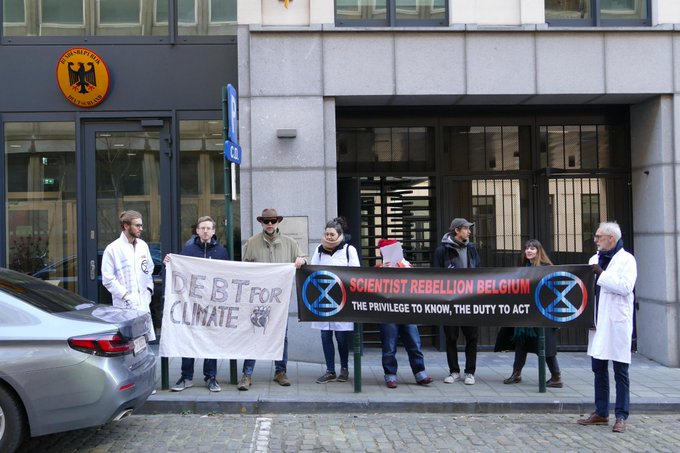Degrowth actions - June2024
News links below
Scientist Rebellion and Growth Kills Manifesto
Scientist Rebellion: Growth Kills manifesto
The ecological crisis poses an existential threat to life on Earth. The IPCC estimates that on our current trajectory it is very likely that we will exceed even the 2 degree limit, and that several tipping points will be crossed, beyond which global warming will accelerate uncontrollably and extreme weather events will become the norm. Around 50 to 80% of the world population could be exposed to one month per year of deadly heat by 2100. A recent review article predicts 1 billion premature deaths in the coming century. Global warming will dramatically increase the ongoing mass extinction, while we have lost 75% of the insects and ⅔ of vertebrates already.
Climate change isn’t even the most worrying environmental crisis. With the collapse of biodiversity and pollution of all kinds, humanity has crossed 6 of the 9 planetary boundaries, causing irreversible damage to life on Earth, and threatening food and water security. The UN’s Global Resources Outlook report shows that global resource consumption, which has quadrupled since 1970, is set to increase by a further 60% by 2060.
Our politicians claim that the environmental transition is compatible with infinite GDP growth through massive investment in ‘green technologies’, the so-called ‘green growth’. However, there is no empirical basis to suggest that it is possible to decouple GDP from environmental pressures on a global scale. As stated by the European Environmental Agency, “it is unlikely that a long-lasting, absolute decoupling of economic growth from environmental pressures and impacts can be achieved at the global scale”. The EEA concludes that “societies need to rethink what is meant by growth and progress and their meaning for global sustainability”.
The IPCC recognises that ‘the degrowth movement, with its emphasis on sustainability over profitability, has the potential to speed up transformations’ and that ‘degrowth pathways may be crucial in combining technical feasibility of mitigation with social development goals’. A recent survey of 789 climate policy researchers found that only 27% support green growth, while 45% are growth agnostic and 28% actively support degrowth. Another study shows different perceptions of green growth, post-growth and degrowth among politicians of the European Parliament, revealing that public discourse does not necessarily reflect their personal opinion.
The science is clear: politicians' obsession with infinite economic growth is leading us straight to disaster.
To justify their ‘green growth’ rhetoric, leaders like to pit the social and environmental crises against each other, as if we have to choose between fighting one or the other. This is a lie: we can strive to ensure the well-being of all, while living within the limits of our planet. What is lacking is the political courage to do so. We need to embrace degrowth: a democratically planned, adaptive, sustainable, and equitable downscaling of the economy. This will lead to a future where we can live better with less and thrive in harmony with the ecosystem. This requires a shift away from the current profit-driven competitive system. Scientific knowledge, instead of promoting an endless run towards productivism and technological innovation, can help to achieve this strategy.
It is true that living in a world with a smaller economy means that many people will have to give up their luxuries, but no one will have to give up their basic needs if the wealth is distributed fairly, the waste of goods is reduced, and the common goods are reclaimed by the people. Shrinking the economy is not about abandoning progress, it is about refocusing our collective energy on what really matters. What's more, there is so much to be gained: a post-growth world would be a happier world, a world in which we work less, have more time for our hobbies, and spend more time with each other, rebuilding the social fabric that has been destroyed by the toxic neoliberal ideology that governs our lives. Instead of focusing on profits and growth, policies can be designed to ensure well-being for all within planetary boundaries.
Nothing grows forever. Unlike planetary boundaries, the economic system is not a law of nature but a social construct that can be tamed. The wild neoliberalism that rules our lives is a recent invention. After the Second World War, governments were much more inclined to intervene in the economy for the common good, and much more reluctant to intervene for the benefit of private capital. Imagine what we could have done with the budgets given to the private sector during the 2008 financial crisis or the Covid-19 pandemic!
The severity of the ecological crisis demands that we fundamentally rethink the economic system in order to guarantee a decent standard of living for all citizens within the limits of the planet, and yet, a few days before the European elections, there are virtually no parties advocating degrowth. We therefore call on the EU government to launch a socially just European Ecological Emergency Plan to fundamentally reform the economy under democratic control.
We demand that the EU:
- Abandons GDP as an index of prosperity
- Creates a sovereign citizens' assembly for to decide our common future, together
- Makes corporations pay the true social and environmental costs of their activities
- Ends over-consumption and the advertising that drives it
- Treats essential resources as commons, free to all
News links
HowMuchMore campaign
September to December 2023
As part of Scientist Rebellion Global's #HowMuchMore campaign, we:
- Organised a mapping fossil ties at universities events. Activists at some universities, such as UCLouvain, have started working towards mapping these ties. You can contact us by email if you want to get involved.
- In the run up to the 3rd edition of Code Rouge we organised a workshop on the future of aviation where we invited speakers from Transport and Environment Europe, StayGrounded, DoeDeurneDicht and Alexander Araya Lopez, an academic studying air protest movements.
- Organised three "science and activism" discussions. These were well appreciated and we hope to continue them in the new year.
- Took part in an action against the EU's hydrogen strategy
- Took part in Code Rouge's mass action against the aviation industry
Debt for Climate
27/2/2023 German Embassy in Brussels
On the occasion of the 70th anniversary of the cancellation of Germany's debt, @CADTM_int, @BelRebSci and @XR_Belgium joins the international @DebtforClimate campaign and calls for the cancellation of the illegitimate debts of the countries of the South #LondonAgreement1953
Click the image below for our video statement.
Make them pay
14/2/2023 Scientists and environmental activists sound the alarm bells on private jet exhibition
Activists from Scientist Rebellion and Extinction Rebellion infiltrated the yearly AIR OPS exhibition organised by the European Business Aviation Association (EBAA) to bring attention to the ultra-wealthy’s disproportionate role in causing catastrophic climate change.
The activists got on stage to ask for a ban on private jets and launched helium balloons in the air containing small alarms to disrupt the event. The environmental activists entered the event hall and got up on stage, interrupting the opening speech by Juergen Wiese, chairman of EBAA.
Read more in our Press Release and in our response to Flying Group's articles in the Flemish press.

Your Luxury our Collapse
13/2/2023 Scientists and Citizens Blockade Private Jet Lounges to Highlight Climate Injustice
‘Make Polluters Pay!’ chant scientists and climate activists who are now blocking the entrance of the Aviapartner Executive Lounge and the Luxaviation terminal, exclusive facilities for the super-rich flying on private jets to and from Brussels, Belgium.
This nonviolent action is part of the global ongoing MakeThemPay campaign to demand that those most responsible for the climate emergency stop their destructive lifestyles.
Scientists and citizens activists from Scientist Rebellion, Extinction Rebellion and Youth for Climate teamed up for a nonviolent action of civil disobedience to blockade both entrances to the Aviapartner ExecuteJet lounge and Luxaviation terminal.
Read more in our Press Release.

Open letter postering
10/11/2023 Cinquentenaire / Jubelpark


